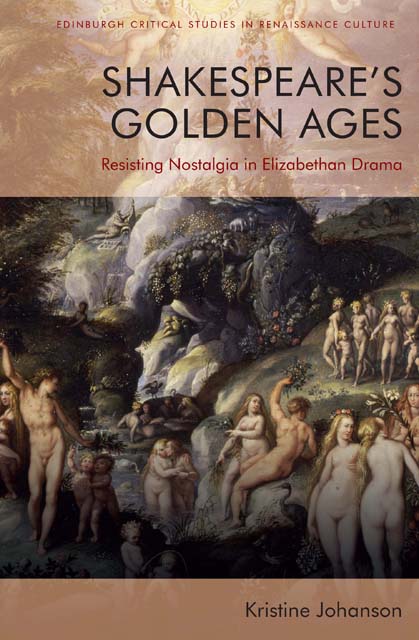Book contents
- Frontmatter
- Contents
- Dedication
- Series Editors’ Preface
- Prologue
- Note on Citation
- Introduction: Rethinking Nostalgia
- 1 Against Nostalgia: Looking Forward to the Future in the Queen’s Men’s Plays and Marlowe’s Tamburlaine
- 2 What Merry World in England? Nostalgic Paroemia and The Second Part of Henry VI
- 3 In the Mean Season: Richard II’s Absent Hospitality
- 4 The Lessons of Nostalgia in Julius Caesar and Sejanus
- Conclusion: Resisting Nostalgia
- Bibliography
- Index
3 - In the Mean Season: Richard II’s Absent Hospitality
Published online by Cambridge University Press: 18 November 2022
- Frontmatter
- Contents
- Dedication
- Series Editors’ Preface
- Prologue
- Note on Citation
- Introduction: Rethinking Nostalgia
- 1 Against Nostalgia: Looking Forward to the Future in the Queen’s Men’s Plays and Marlowe’s Tamburlaine
- 2 What Merry World in England? Nostalgic Paroemia and The Second Part of Henry VI
- 3 In the Mean Season: Richard II’s Absent Hospitality
- 4 The Lessons of Nostalgia in Julius Caesar and Sejanus
- Conclusion: Resisting Nostalgia
- Bibliography
- Index
Summary
In his seminal The Country and the City (1973), Raymond Williams captures the impossibility of satiating the nostalgic in his image of an unending, time-travelling escalator. For every generation, its predecessor offers salvation, some respite from the perceived degeneration and decline of the present. The escalator symbolises the sense of a ceaseless descent into the past to search for perfection, for refuge. Of equal importance and symbolism is the escalator's inherent rejection of return. As I emphasised in the Introduction, through various discourses early modern English culture articulated possibilities of reclaiming or renewing the past. These discourses arguably augment the rhetorical power of claims to return to an idealised past. While The Country and the City has informed theories of early modern hospitality, early modern discourses of hospitality themselves trouble the singular direction of Williams's striking metaphor. Felicity Heal's definitive study of early modern hospitality relies partly on Williams’ recognition of a mythos emergent from the dichotomy of rural and urban, country and city. As Heal's analysis of early modern literature and ballads persuasively argues, this dichotomy is characterised as hospitable (country) and inhospitable (city). Furthermore, a second dichotomy appears alongside it: that of the hospitable past and the inhospitable present. Such an opposition situates hospitality as both a product and inherent quality of an idealised past, and in so doing contributes to the creation of a ‘myth of hospitality’, the notion that there once was a space and time – a past England – when hospitality was readily available. What sets the nostalgic practitioners of Heal's ‘myth of hospitality’ apart from the individual on Williams's escalator is how their turn backwards is used to imagine both present and future. In the discourses of early modern England, the hospitable past could return.
Using the ur-narrative of hospitality, discourses of the hospitable countryside or the hospitable past could, and did, both censure ‘the attitudes of [the] present-minded urban man’ and effect a ‘call to action’, as such demands insisted that the gentry and nobility reproduce their ancestors’ behaviour by providing hospitality. Latent nostalgia becomes essential to enacting change in the present: to persuade present landowners to be hospitable, the idealised actions of their personal pasts (via their forebears) must be invoked. Hospitality, in this view, operates as one type of English political inheritance.
- Type
- Chapter
- Information
- Shakespeare’s Golden AgesResisting Nostalgia in Elizabethan Drama, pp. 96 - 131Publisher: Edinburgh University PressPrint publication year: 2022



